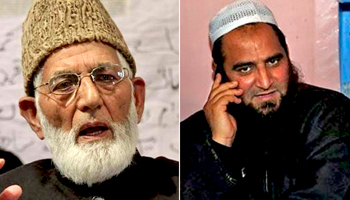Srinagar, Apr 17: The Jammu and Kashmir Police on Thursday placed separatist leaders Syed Ali Shah Geelani and Masarat Alam under house arrest ahead of their rally in South Kashmir's Tral town on Friday.
 "Geelani has been placed under house arrest. A posse of policemen has been deployed outside the Hurriyat chairman's house at Hyderpora as a preventive measure to maintain law and order," a police officer said, adding that similar restriction has been slapped on Alam.
"Geelani has been placed under house arrest. A posse of policemen has been deployed outside the Hurriyat chairman's house at Hyderpora as a preventive measure to maintain law and order," a police officer said, adding that similar restriction has been slapped on Alam.
Mirwaiz Umar Farooq of the moderate Hurriyat Conference will also be not allowed to proceed towards Tral, police sources said. It was not clear whether he has also been placed under house arrest.
The government of Chief Minister Mufti Mohammed Sayeed has already denied permission to separatists for Friday's rally in Tral town of Pulwama district.
Sayeed had earlier in the day said that waving of Pakistani flags and raising pro-Pak slogans were "not acceptable" and "will not be tolerated". The remarks came after the CM came under attack from all quarters including ally BJP for allowing hardline Hurriyat leader Geelani to hold a rally in Srinagar on Wednesday where pro-Pakistan slogans were shouted and Pakistani flags waved.
In view of the development, Sayeed had asked police to deny permission for Friday's rally which was scheduled to be taken from Srinagar to Tral where a youth was killed allegedly by the Army while in their custody.
The police is also likely to enforce prohibitory orders under Section 144 to restrict movement of people.
Geelani issued a statement late in the evening saying that he would not be cowed down by the state government.
Hours after the rally in Srinagar on Wednesday, Sayeed was called by Home Minister Rajnath Singh who asked him to take "immediate and stringent" action against the law breakers.
The Home Minister again asserted today, "We will not tolerate anyone raising slogans like 'Pakistan zindabad' on Indian soil.
"There can be no compromise on national security. Politics cannot impinge on national security," he told Sayeed.
During Wednesday's rally, Masarat Alam, released from jail last month, had praised founder of Lashker-e-Toiba terror outfit Hafiz Mohammed Sayeed and asked people to join hands with his outfit.
The Jammu and Kashmir Police has registered an FIR against Geelani, Alam and another separatist leader from Hurriyat Conference under various sections of Ranbir Penal Code and Unlawful (Activities) Prevention Act.





Comments
Add new comment